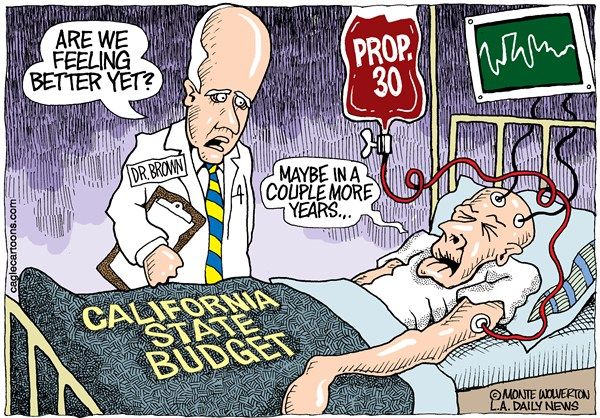Lawmakers calling Gov. Brown’s bluff on Prop. 30 revenues
Jan. 8, 2013
By Katy Grimes
On the first day of the new legislative session on Monday, two Republican lawmakers wasted no time introducing legislation to add some necessary spending restrictions to Proposition 30.
Passed by California voters in November, Prop. 30 increased the income tax on individuals with income of $250,000 or more, and upped the sales tax on everybody in the state.
The tax proposition was primarily sold to voters as a promise of new funding to be funneled into California public schools.
The new taxes are supposed to raise $50 billion over seven years. But the number might not be that high if job creators and business owners will stop hiring or leave the state. It’s also not clear how much money will go to education.
Promises, promises
Gov. Jerry Brown campaigned relentlessly for Prop. 30’s passage, spending much of his time on college campuses and at public schools.
Perhaps calling the governor’s bluff, Assemblyman Jeff Gorell, R-Camarillo, and state Sen. Anthony Cannella, R-Ceres, introduced Assembly Bill 67 and Senate Bill 58 Monday to deal with the promised educational funding.
They said that while there already is a provision in Prop. 30 to ensure this new revenue flows directly to schools, there is also a counter provision in the measure “which allows the Legislature to reduce current General Fund dollars for K-14 education. As a result, schools will see just a $2.6 billion increase in funding in 2012-13, even though Proposition 30 will generate $5.3 billion in new revenue,” their press release said.
Gorell and Canella added, “[T]here is no provision in it guaranteeing that there will be funding increases for California State University or University of California campuses, despite what proponents of the measure said to taxpayers and students during the campaign.”
While the 2013-14 budget increases funding by $125 million for each system, this is never guaranteed money and is usually reversed by the Legislature.
Additionally, the nonpartisan Legislative Analyst recently announced that funding for the UC and CSU systems will remain relatively flat over the next five fiscal years, even with the Prop. 30 money.
“The proponents of Prop. 30 traveled to many college campuses telling students there would be no new fee increases if it passed,” Cannella said in the press release. “As we have seen so many times before, money that should go to our public colleges and universities could easily be transferred to fund other programs. This bill makes that promise a guarantee. I hope that all legislators understand the importance of this bill so we can uphold the promise to our students, and give peace of mind that there will be no tuition increases, period.”
The bills would ensure that what voters were sold with Prop. 30 is actually upheld. One way to do this is by requiring that there be no mandatory tuition and fee increases for CSU and UC campuses in the current academic year.
Additionally, the measure says it would be the intent of the Legislature that funding for CSU and UC campuses be increased while Prop. 30 is in effect.
Related Articles
School districts seek help with pension bailout costs
The bailout of the California State Teachers’ Retirement System enacted last year requires a 70 percent increase in pension contributions
Budget in a capsule: Teachers (surprise, surprise) get Prop. 30 $
Jan. 10, 2013 By Chris Reed The 2013-14 budget that Jerry Brown presents today is being billed by the Los
50 years after the Berkeley Free Speech Movement
It’s been 50 years today since Mario Savio gave his “put your bodies upon the gears” speech at the University





